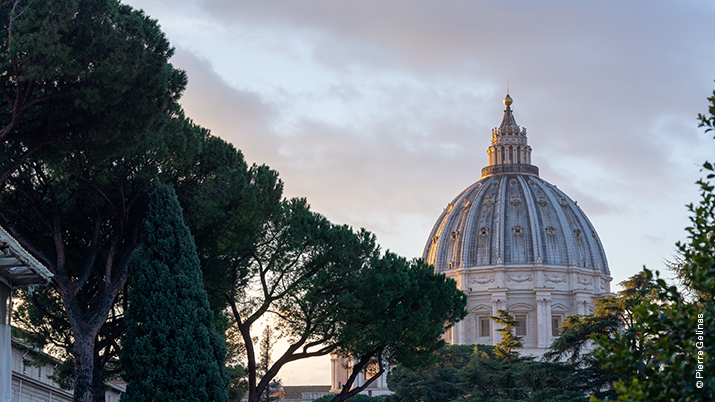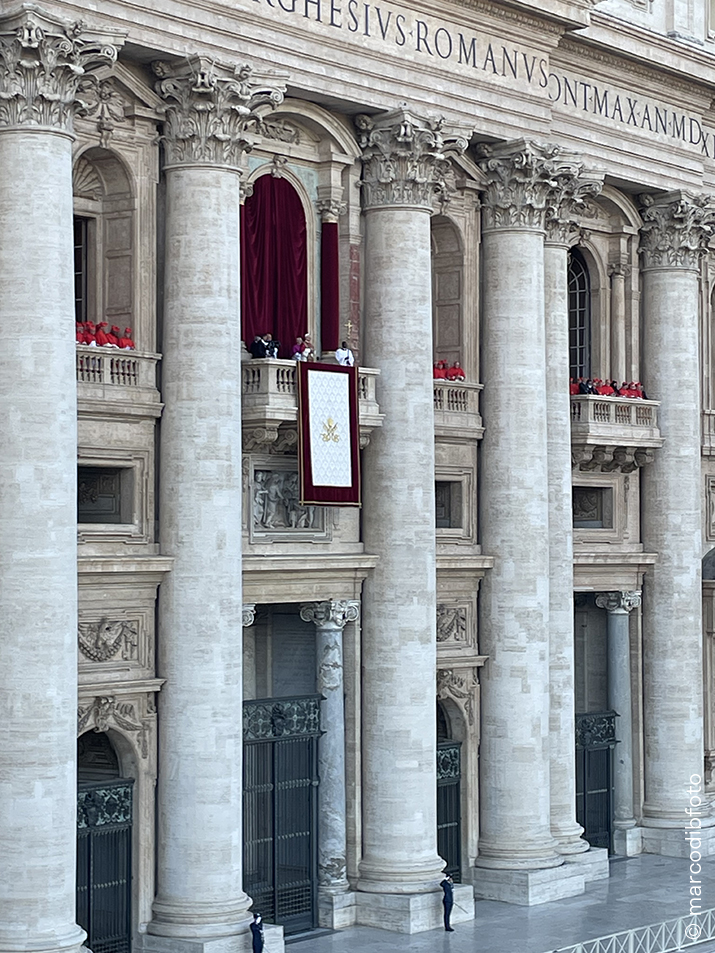There is always some unease when one finds oneself in a position of privilege. Especially in the face of an undeniably unique, inevitably historic, perhaps even prophetic event. When the big window opened and the red curtains were drawn back, I was standing on the Charlemagne balcony, just a few metres in a straight line from the Loggia of the Blessings, upon which the eyes of the entire world were fixed. Looking at St. Peter’s Basilica, the colonnade to the left bears the name of the founder of the Carolingian Empire, who was crowned emperor by Leo III on Christmas Day in the year 800, when the Vatican Basilica was not yet the one we know today. To get there, one must climb the dark steps of an ancient staircase, although the same route is best avoided when three or four hundred people need to do the same in a few minutes; then, taking the lift is a better option. It might be a bit shaky, but it is safe. The operator advises the more sensitive to avoid looking down. The “journey” is brief; the view is unique. On the way down, we find ourselves in a kind of open-air museum, with more statues of saints than we have time to count.
Then it's time to put on a headset, adjust the microphone, join our colleagues and go live to describe the incredible sight before us: tens of thousands of people gathering after having seen or heard of the “white smoke”—a centuries-old method that continues to announce the same event, always new and ancient at once: the election of the Pope. Time appears to slow down, the wait is nearly over. He will soon appear. The director 'intimates' to continue talking until the fateful moment. Suddenly there is silence. ‘Annuntio vobis gaudium magnum; habemus Papam: Eminentissimum ac Reverendissimum Dominum Robertum Franciscum Sanctae Romanae Ecclesiae Cardinalem Prevost, qui sibi nomen imposuit Leonem Decimum Quartum'.
Leo XIV. The name is the first choice a Pope makes, so to understand which way the universal Church is headed, we start by looking at how his closest predecessor with the same name acted. Leo XIII was the Pope of Rerum Novarum, which can be translated into English as 'Of new things', a pillar of the Church's social doctrine. "It can't be an accident," thinks the reporter with the headset, and he says so, but it's time to be quiet again, it's time for the blessing: ‘Peace be with you all! Dear brothers and sisters, these are the first words spoken by the risen Christ, the Good Shepherd who laid down His life for God’s flock. I would like this greeting of peace to resound in your hearts, in your families, among all people, wherever they may be, in every nation and throughout the world. Peace be with you! It is the peace of the risen Christ. A peace that is unarmed and disarming, humble and persevering’.
The word Peace already appears five times at the beginning of the greeting. This cannot be an accident either. Not only that, Peace must be 'disarmed' and 'disarming' and already this begins to be a clear indication. Robert Francis Prevost, dual US and Peruvian citizenship, the second Pontiff from the American continent, the first from the United States of America, the first belonging to the Order of St Augustine, 70 years old next 14 September, seems to be going in a precise direction: building bridges with dialogue and encounters between peoples.
The window of the loggia closes, the people start to evacuate, hundreds of journalists and photographers from all over the world put their notebooks away, switch off their computers, dismantle lenses as long as those in spy films, descend in the lift and go back to covering the usual news, the kind that fills the newspapers on the days when a Pope has not just died or another has not just been elected. Meanwhile, Vatican diplomacy is back at work, just as it was quietly active on the sidelines of Francis’s funeral — without much fanfare, as is typical of seasoned diplomats who know how to operate.
The 'noise', instead, comes from the words spoken by Leo XIV a few days later in Paul VI Hall. It is not far from Charlemagne's arm — it lies lower, on the ground, with no need to get into a shaky lift to reach it — yet despite the ease of access, here the media pay less attention to noticing the details. The event is over, the world's greats have gone home. Sometimes the facts of history are read as if they were a show, the result being that after the credits few people verify what happens after the adverts.
Leo XIV meanwhile held his first general audience on 21 May. Before greeting those present, he launched a humanitarian appeal, recalling the "increasingly worrying" situation in the Gaza Strip, where the attacks are still ongoing and people are dying due to the lack of food. Prevost calls for the 'entry of dignified humanitarian aid' and invites all believers to disarm 'their hearts'. But that's not enough — certain things had already been said in the very places meant for mediation, in multilateral institutions that may be subject to criticism and certainly open to improvement, but whose absence would carry serious risks.
The centre of world diplomacy should be, and perhaps is not enough, the United Nations building in New York, and it was there that the Secretary of State, Cardinal Pietro Parolin, went on 19 May to clarify what the strategy of the new pontificate will be. Under the guidance of Leo XIV, the Holy See is committed to working alongside the representatives of nations 'to promote human dignity, protect the vulnerable, and build bridges where mistrust might otherwise prevail,' said the cardinal in a speech delivered at the United Nations Headquarters during a reception hosted by the Holy See’s Permanent Observer, Archbishop Gabriele Caccia. The choice of a new Pontiff is an opportunity "The election of a new Pope is an occasion of renewal, not only for Catholics, but for all who seek a world of greater justice, solidarity, and peace", he added, hoping that the Holy See and the representatives of the nations can move "forward together, inspired by the hope and vision of Pope Leo", who already "in his first days as Successor of Peter, expressed his deep commitment to building bridges, emphasising the need to meet, dialogue and negotiate". In a world 'marked by divisions, conflicts and pressing global problems - from climate change to migration to artificial intelligence', the Pope 'calls us to embrace a diplomacy of encounter, which listens with humility, acts with compassion and seeks the common good above all else', Parolin concluded.
It seems clear, then, that the name he chose, his first words, and everything Leo XIV has communicated so far all point toward Peace — a Peace to be built, not merely awaited.
mf









